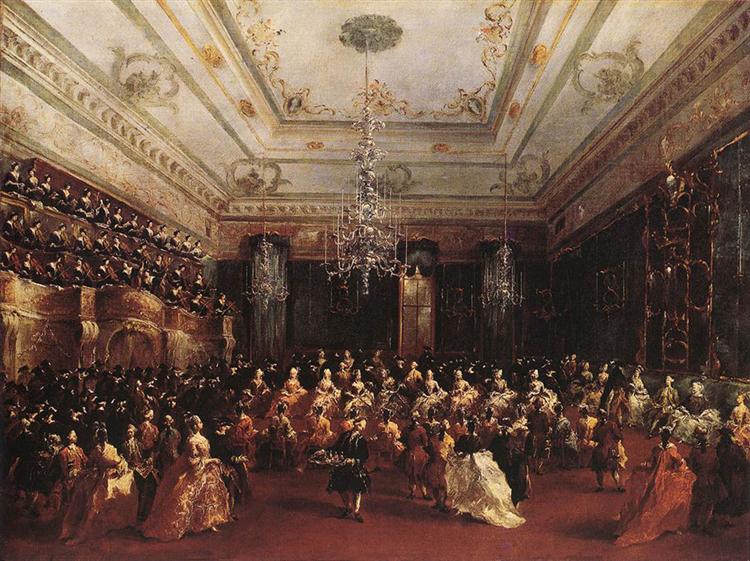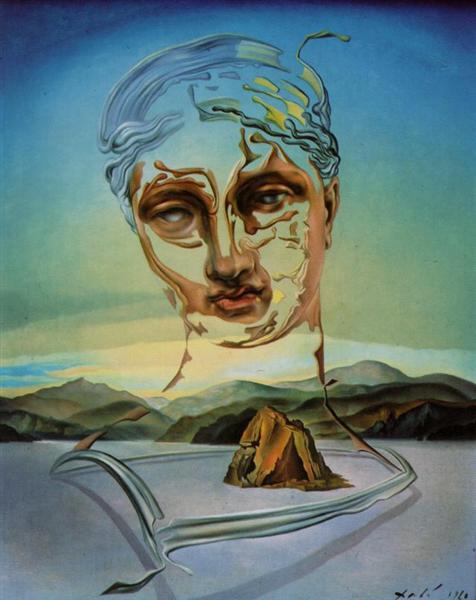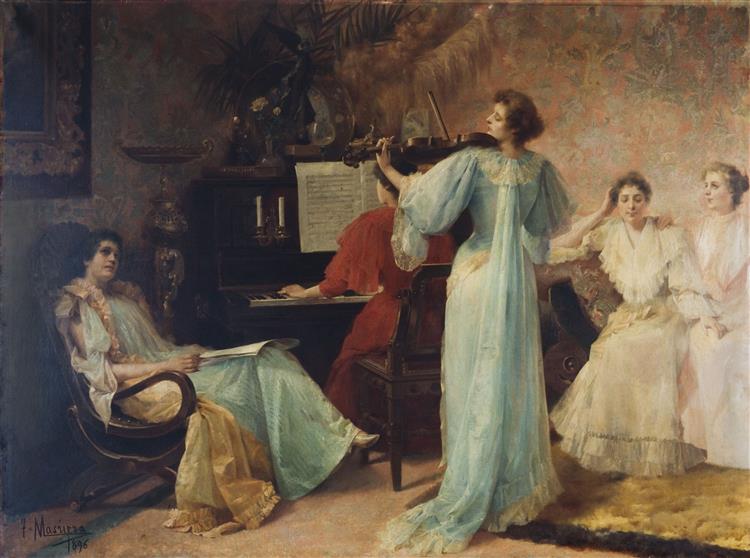Richibi’s Weblog
Just another WordPress.com weblog
Category: Mozart
April 27, 2024
a veritable Schubertiade, VII
“Birth of a Divinity“ (1960)
Salvador Dali
______
during the third evening of recitals, the
program, to my surprise, starts with a
work even earlier than the earliest
one we’ve heard yet in this
Schubertiade, his D 568, his Seventh
Schubert’s Piano Sonata No. 4 in
A minor, D 537, was written when
he was seventeen, he would’ve
been, and was, steeped in Mozart,
music to amuse musical coteries
but at the start of the second movement,
I heard an air I’d heard somewhere
before, it turned out to be the seed of
a magical part in one of his later
transcendental pieces
Schubert was already imbued with his
divinity, see above, you can hear it,
listen
R ! chard
April 23, 2024
a veritable Schubertiade, VI
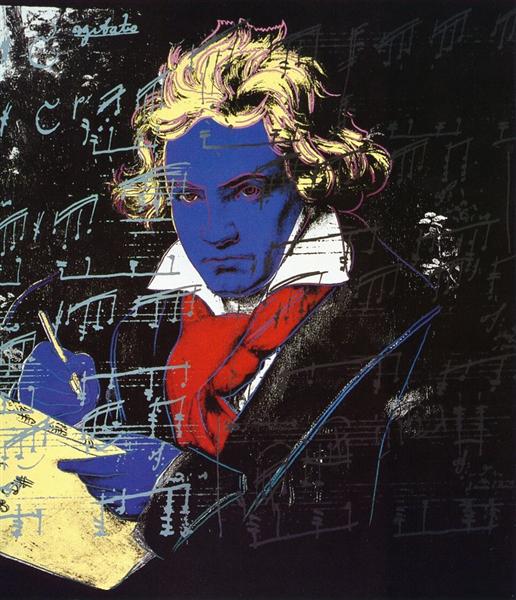
by this time, in his Piano Sonata in A minor,
D 845, Schubert has accumulated so much
Beethoven that his Beethoven is beginning
to shine through in his own compositions,
Beethoven was a forefather, still present,
it’s often difficult to tell one, indeed, from
the other, even here
Beethoven, see above, punched through
Classicism – Mozart, Haydn – its artificiality,
delivering emotion, instinctively, from the
very start, from which he nearly
single-handedly delivered to the world no
less than Romanticism, like delivering the
recalibration of time and space after
Einstein essentially, so profound a
cultural metaphysical reorganization
Schubert remains ever more courteous,
more beholden to the upper crust that
supports him, and that he ever wants to
court, you can hear it, listen, there is no
confrontation here, just, dare I say,
entertainment
Schubert was not a revolutionary
R ! chard
April 18, 2024
a veritable Schubertiade, V
“The Dreamer“ (1820 – 1840)
Caspar David Friedrich
______________
from the start, in his Piano Sonata in C major, D 840,
Schubert is steeped in Mozart, the exhilaration, the
fantasy, not surprisingly, Mozart is Schubert’s
motherland, the courts, the salons, the chamber
music, in Schubert’s day, aristocrats still sponsored,
to a great degree, the arts
but soon the Romantic impulse takes hold, the
introduction of melancholy into the mix, rather
than sang froid, artifice, merely, Schubert has
imbibed, to supplement his manifest technical
agilities, the temper of the times, Schubert is
moving his cultural world forward, into
Romanticism, see above
there are only two movements in his D 840,
there are sketches of its third and fourth
movements, but Schubert had abandoned
them, the sonata, unfinished, was only
published after he died, profoundly worthy
still, if truncated
what do you think
April 16, 2024
a veritable Schubertiade, IV
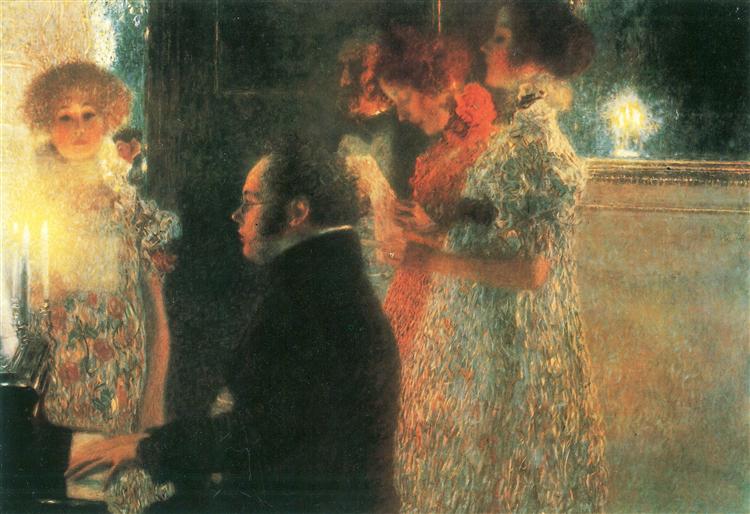
“Schubert at the Piano II“ (1899)
Gustav Klimt
______
for the second evening of Schubert sonatas
during my May Schubertiade, it wouldn’t be
surprising to hear again an early work, 1819,
Schubert would’ve been 22, the series is
undoubtedly and necessarily somewhat
chronological
his Piano Sonata in A major, D 664, is
blatantly anchored in the Classical idiom,
you can hear Mozart all over the place, not
all pejoratively, Mozart is effervescent, full
of exuberance and creativity, Schubert
diligently follows
but Romanticism equals intimacy, poignancy,
which Schubert touches upon in his andante,
the second movement, to a degree not yet
as markedly as, for instance, Chopin yet,
famous for his sweeping Romanticism, but
still convincing and promising
the third movement, the allegro, is right back
at Mozart, to delight the aristocracy, his
essential audience, see above
listen
R ! chard
April 9, 2024
a veritable Schubertiade, III
“Impression, Sunrise“ (1872)
Claude Monet
________
what struck me most about Schubert’s Piano
Sonata no. 17 in D major, his D850, was, more
than its emotional impact, its technical
wizardry, from the start Schubert dazzles with
his prestidigitation, his manual dexterity, the
notes fly
there’s a lot of Beethoven in this composition,
working against the beat, apart from the fourth
movement, the rondo, Schubert is being
unequivocally Beethoven
the fourth movement is, incidentally, utter
Mozart, you can tell from the preponderance
of trills
texture, meanwhile, overcoming melody,
in, most notably, the third movement, is
right out of Chopin, his “Winter Winds“
for instance, an inspired combination
of both melody and texture, where is
the supremacy of either, listen, you tell
me, do the “Winds“ conquer the groans,
the tribulations, of the underlying melody,
the left hand, the low notes, the chthonic,
the earth, or does the dexterousness of
the right hand, the ephemeral, the
transitory, win the day
texture will overcome melody eventually,
as the century moves along, Impressionism
will prioritize perspective over emotion, the
head over the heart, Debussy, among
others, Renoir, Monet, Pissaro, will
dominate, see above, but that’s another
story
meanwhile Schubert
listen
R ! chard
April 5, 2024
a veritable Schubertiade
“Una melodia de Schubert” (c.1896)
___________
in May, the recital society of my city is featuring
an internationally famous pianist doing several
Schubert sonatas, twelve of them, spread out
across four evenings, a veritable Schubertiade,
I’ve got tickets for all of them
maybe you’d like to join me
I always do my research before attending any
cultural event, much like reading up on Italy,
for instance, before going there
the program seems to be more or less
chronological, the first night featuring
earlier Schubert sonatas
his D568, his Seventh, composed in 1817,
is, to my mind, enchanting, but not yet
reaching the heights of his later
transcendental productions, more of
which later, should you stick around
Schubert always sounds a lot like Beethoven,
but with more civility, less confrontation,
Schubert is still chamber music, and, in this
outing, I find he sounds a lot like Mozart even,
dexterous, delightful, but fundamentally
frivolous
it’s the difference between dessert and food
that will sustain you, that’ll speak to your soul,
more about which later, should you stick
around
meanwhile, D568, enjoy
R ! chard
December 24, 2023
sonatas, continued (Messiaen – “Quartet for the End of Time”)
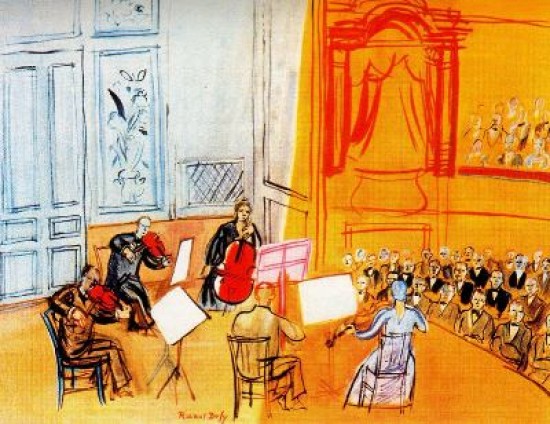
“Red Quartet“
Raoul Dufy
_____
if a trio is a sonata written for three instruments,
a sonata, a piece of music consisting of more
than one segment, or movement, written for
four instruments, is called a quartet
a quartet is also what we call the group itself
of four players
quartets can play more than just quartets, they
can also play waltzes, nocturnes, rhapsodies,
for instance, just as trios, groups of three, can
play more than just trios
but quartets, the form, have had a long and
glorious history, from Mozart and Haydn,
the Classicists, through Beethoven, an
ardent Romantic, to the more political
Shostakovich, enemy, for a time, of his
repressive Soviet state, and on to
Messiaen, who composed his own
Quartet for the End of Time, in a Nazi
concentration camp
let me start with the Messiaen, now that I’ve
whetted your appetite, and work our way back
to Mozart to see where we came from, and
how
there are seven movements in Quartet for
the End of Time, not the Classical three or
four, atonality abounds, discordant, not
unexpectedly, progressions, repetition also
takes its punches, not easily identifiable
throughout, but tempo, the third pillar of
Western music, more or less holds its
own, keeping the tradition, however
precariously, together, listen
it’s 1941, we’re in a concentration camp,
Messiaen is caught between hope and
despair, give the guy a break, he hasn’t
many absolutes to hold onto, tempo
might be one of them, the heartbeat,
pulse, perseverance, an actual human
pace, a rhythmic instinct, by which
eventually, hopefully, meaning
transpires
hope is in one’s creativity, he says, each
individual answer can be a tribute to
one’s own tribulations, our responses
can be poetry, lessons rather than
invectives, epiphanies rather than
agonies, may the Force, in other words,
be with you, in the face of even the most
trying difficulties, honour can supplant
trials, he concludes, given grace and
integrity
Beethoven says pretty much the same
thing in his last piano sonata, remember,
his Opus 111, listen, a not not impressive
corroboration
R ! chard
November 22, 2023
November / Month of the Sonata – 22

“Piano“
José Garnelo
_____
having heard Stravinsky’s Concerto for
Two Pianos already, if you’ve taken in
my last instalment, you’ll find it perhaps
the most instructive of any of my
suggested comparisons to hear beside
it Mozart’s Sonata for Two Pianos, the
first, written in 1935, the second, 1781,
you’ll hear the passage of time fly by
both here are played by the same two
performers, brothers, incidentally, an
extraordinary couple, making your
aesthetic decision that much more
contained, straightforward
though Stravinsky might be here
utterly unexpected, even disarming,
he’s evidently much more in tune
with the Twentieth Century, even
the 21st, than the more bucolic
music of, energetic as it is, Mozart,
who is not of our era, however still
entirely relevant
with Stravinsky, you hear the traffic,
the hustle and bustle of modern life,
the pulse and frenzy of a more
frenetic century, though it must be
remembered that Mozart wrote his
piece between the American, 1776,
and the French, 1789, Revolutions,
a couple of historically seismic
events, not at all not turbulent
if you listen, you can hear it all in
the music, art is like that
enjoy
R ! chard
November 18, 2023
November / Month of the Sonata – 18

